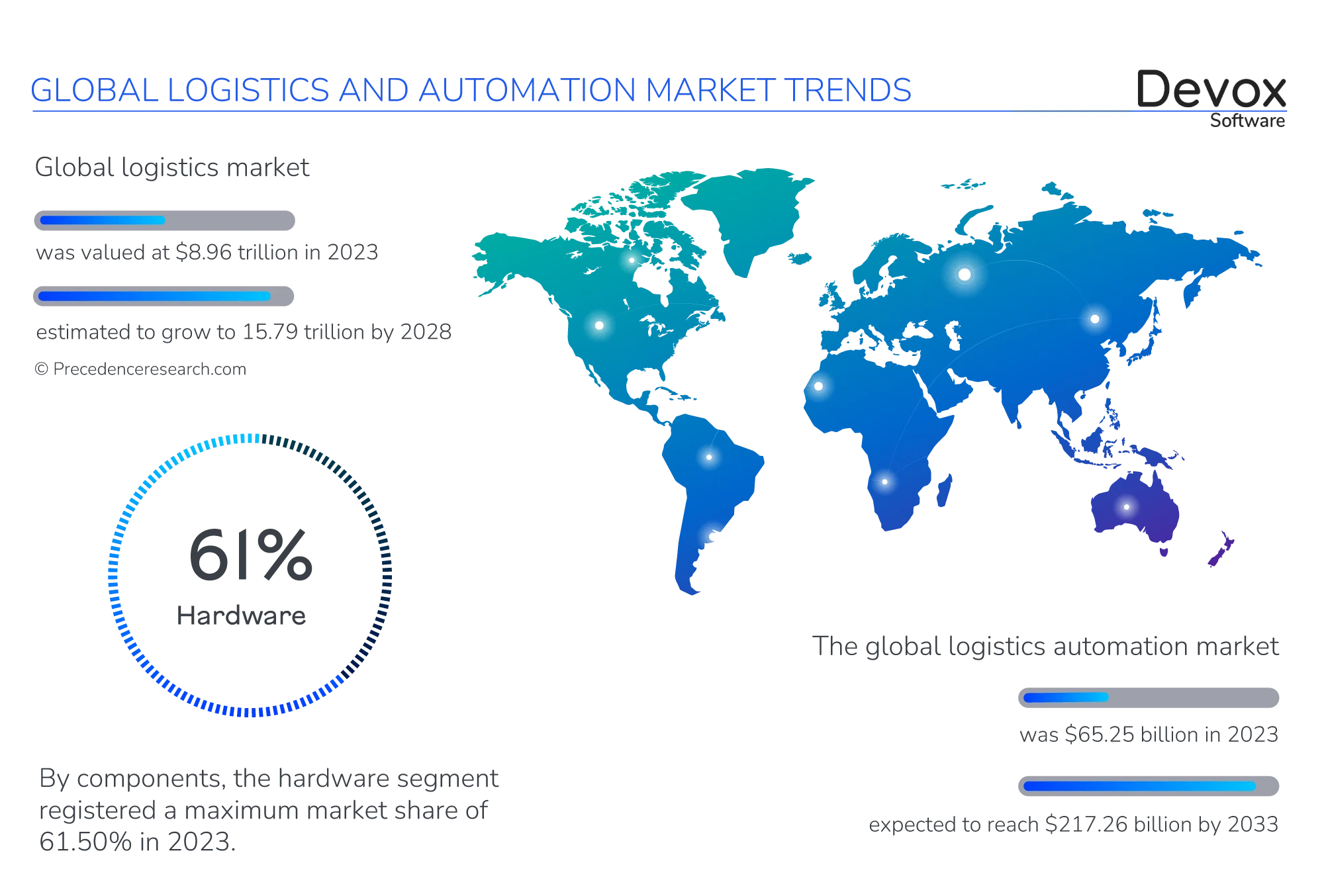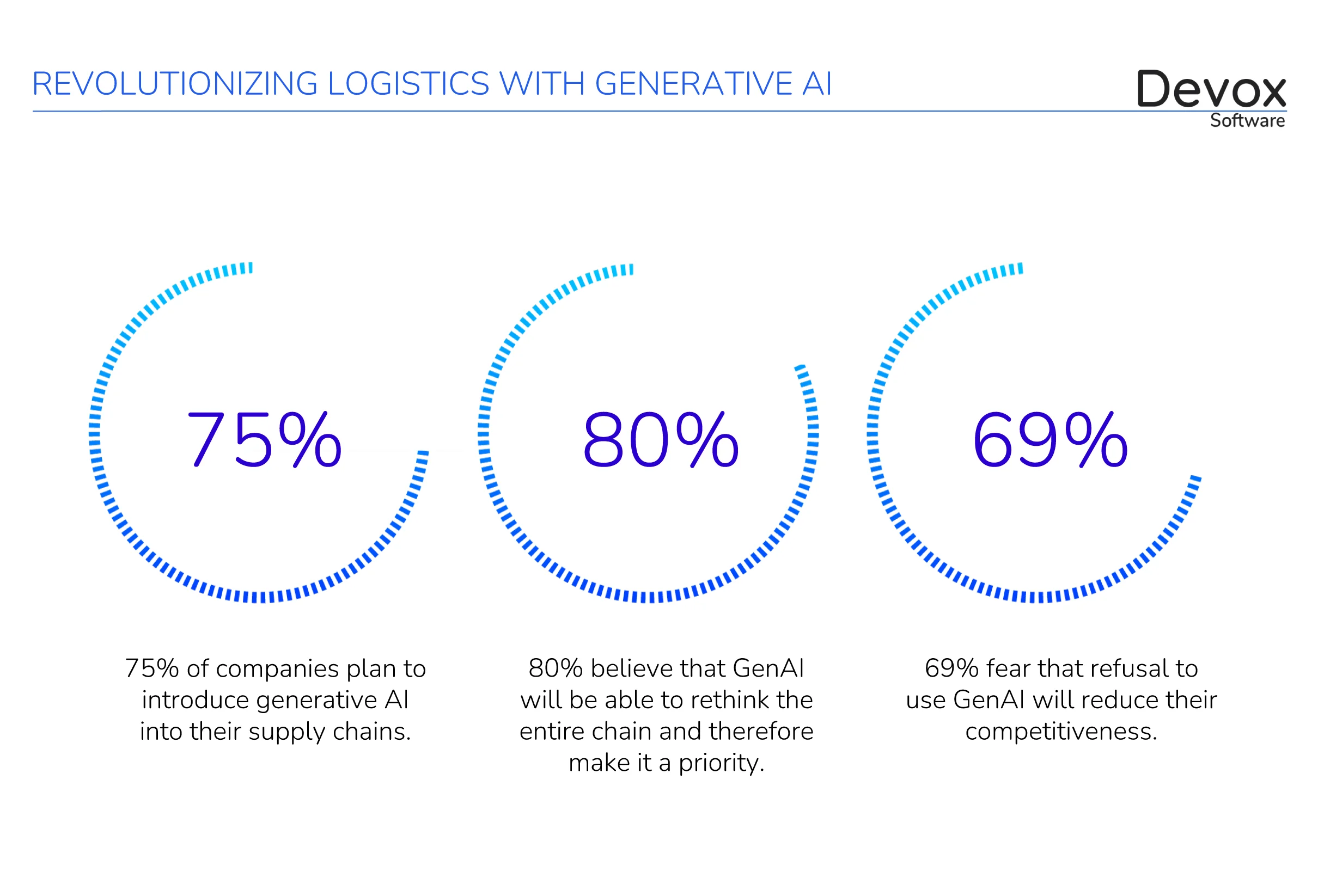Table of content
Whether it’s optimizing processes, reducing operating costs or improving the customer experience, the transformative power of technology in logistics is undeniable. When combined with strategic outsourcing, the potential for innovation and growth becomes almost seismic.
These two pillars — technology and outsourcing — offer a dynamic synergy capable of elevating supply chain operations to unprecedented levels of efficiency and resilience. Together, they promise not just incremental improvements, but a re-imagining of what is possible in a hyper-connected, data-driven world.
But this transformation hinges on crucial questions: How familiar are you with the latest technological revolutions that are changing the supply chain landscape? And how strategically are you using outsourcing to expand your logistics capabilities? The ability to master these elements can not only set the course for competitive advantage as the industry rapidly evolves, but can also determine the sustainability of your supply chain operations.
Tech-Driven Efficiency: Accelerating Supply Chain Operations
Technology has completely redefined the possibilities of supply chain management. Tasks that used to take days — even weeks — can now be completed in hours, sometimes even minutes. Thanks to automation and cutting-edge tools, efficiency has skyrocketed, allowing teams to focus on what matters: identifying new opportunities and deepening market knowledge.
For companies seeking to modernize their operations, logistic software development plays a critical role. By implementing tailored solutions, businesses can optimize workflows, integrate advanced technologies like AI and IoT, and ensure smooth coordination across all supply chain stages. These tools not only simplify complex logistics but also give companies a competitive edge in the fast-paced global market.
Simplify Processes, Enhance Efficiency
Logistics is no longer just about the transportation of goods but about precision, speed, and intelligence, driven by the digital transformation of the industry. Advanced technologies such as logistics management systems (LMS), enterprise resource planning (ERP), and warehouse management systems (WMS) are changing the game and transforming complexity into clarity.
For businesses with unique supply chain challenges, custom logistics software development offers the opportunity to build tailored solutions that address specific operational needs. These custom tools enable seamless integration of advanced technologies, streamline workflows, and ensure that logistics processes remain agile and efficient in a rapidly evolving market.
At the heart of this change is an LMS that acts as the command center of your supply chain, automating tasks and streamlining everything from order fulfillment to resource allocation. With ERP systems integrating logistics, warehousing, finance, and human resources into a single platform, companies gain real-time insights and seamless operations coordination. WMS solutions take warehousing to the next level, automating storage, picking, and packing for unprecedented efficiency. The common denominator? Real-time visibility. When you have an eye on your supply chain, you can not only react to problems but also anticipate them. With these tools, logistics shifts from being a challenge to becoming your competitive advantage in a fast-changing world.
Leverage Tech, Build Trust
Introduce new technologies that are reliable and compatible with existing systems, positioning you as a forward-thinking leader in logistics. Leverage seamless integration and state-of-the-art automation to ensure a smooth, trouble-free transition. Enhance your logistics strategy with tools that increase efficiency and strengthen your reputation as a market leader.
For companies looking to modernize and streamline their supply chain, a customized logistics software development service can be a game changer. By implementing bespoke solutions, companies can optimize their processes, improve real-time visibility and ensure seamless integration with existing workflows.
To stay ahead, the integration of generative AI in logistics is no longer an option, but a necessity. Companies that embrace innovation today are securing their leadership position for tomorrow. Let’s take a look at what industry leaders are saying about the impact of GenAI on logistics.
But here’s the thing: An unprepared implementation is a recipe for chaos. The data speaks for itself: Generative AI is reshaping the logistics landscape. However, achieving meaningful results requires a thoughtful approach. By preparing your organization and aligning your workflows, you can avoid chaos and unlock the full potential of this technology. The right LMS can work wonders if your organization is prepared. Take the time to plan the changes, get your team on board, and make sure the system integrates seamlessly with your current workflows. If you do it right, it will be worth it.
By using tools like AI, robotics, and machine learning, companies can automate their teams’ tedious work, including inventory checks, order tracking, and even packing in the warehouse.
Supply chain management (SCM) software is the key enabler for companies that want to go one step further. These tools connect the dots and turn the entire supply chain into a well-oiled machine. SCM software centralizes data, automates workflows, and enables seamless collaboration between suppliers, warehouses, and distributors. With these solutions, companies can forecast demand more accurately, eliminate bottlenecks, and strengthen relationships with partners and customers. It’s about building an efficient and future-proof supply chain.
Ensure Consistency, Delight Customers
Punctual and reliable deliveries are not just about meeting deadlines but also about gaining and maintaining customer loyalty. A single delay or mistake can shatter trust, so consistency is key. The good news? Technology is here to help. Remember when IoT, AI, and blockchain were just hype? Those days are over. Today, these tools are the backbone of supply chain innovation. They provide real-time insights, automation, and secure, traceable transactions that ensure your operations run like clockwork.
To achieve this level of precision, many companies turn to custom software development for logistics. Tailored solutions address the unique challenges of supply chain operations, from real-time tracking and route optimization to inventory management and compliance automation. By leveraging customized tools, businesses can enhance efficiency, reduce risks, and deliver exceptional customer experiences.
You want your customers to come back? It’s all about creating a seamless shopping experience. Real-time order tracking and personalized notifications are not just a perk; they’re expected. With the help of digital tools, you can anticipate your customers’ needs and deliver exactly what they want when they want it.
Order management systems (OMS) are essential to achieve this level of precision. An OMS pulls everything together, managing and tracking orders across multiple channels. Whether it provides real-time updates, handles complex order flows or adapts on the fly, an OMS keeps things running smoothly from checkout to doorstep.
Asset tracking systems are critical for companies that manage physical assets. Using RFID and GPS, these systems provide real-time insight into vehicles, goods, and inventory. They help prevent loss or theft and keep your supply chain accountable by ensuring every asset is in the right place at the right time.
And then there’s freight — the lifeblood of logistics. Freight management solutions cover everything: selecting carriers, tracking shipments, and optimizing costs. Integrating with other systems ensures a smooth flow of goods from A to B. Do you want to reduce shipping costs and speed up deliveries? Then Freight Management is the correct address for you.
For freight brokers, there’s a smarter way forward. Freight broker software automates carrier selection, shipment tracking, and invoicing, eliminating inefficiencies and ensuring faster, more reliable deliveries. Brokers can reduce their administrative burden by using tools like these and prioritize getting their goods to their destination on time and within budget.
Cut Costs, Maintain Quality
Rising logistics costs do not have to accompany a loss of quality. With smarter workflows and streamlined processes, companies can achieve efficiency without compromise. Automation and optimized workflows are your allies in achieving more with less.
A tailored software application development for logistics solution empowers businesses to optimize operations, improve transparency, and reduce overhead. From inventory management to real-time tracking, custom applications offer the tools needed to build a supply chain that is both cost-effective and future-ready.
The key to a stable supply chain lies in transparency: you must know what happens at every stage. Centralized data management systems give you a clear overview of your operations and allow you to make informed decisions quickly. With real-time visibility, you can proactively address challenges, ensure transparency, and keep everything running smoothly.
Modern customers demand more: real-time tracking, seamless experiences, and a transparent supply chain. By using digital tools, companies can meet — and exceed — these expectations.
Beyond convenience, digital tools do more than streamline — they uncover inefficiencies. From optimizing delivery routes to avoiding overstocking, real-time data allows you to act faster and wiser. An inventory management system (IMS), for example, helps track stock levels, reduce waste, automate reordering, lower costs, and consistently provide high service quality.
Similarly, a transportation management system (TMS) eliminates the guesswork in logistics. By automating route planning, shipment tracking, and delivery schedules, TMS solutions reduce transportation costs while increasing efficiency. Real-time insights ensure on-time deliveries and make managing complex logistics seamless.
Fleet management systems can do more than track vehicles—they transform operations. By monitoring vehicle health, optimizing routes, and reducing fuel costs, these tools lower maintenance costs and improve delivery reliability.
Ensure Compliance, Lower Risks
International trade compliance is not for the faint-hearted — one slip, and you face fines, delays, or worse. But here’s the thing: Compliance doesn’t have to be complicated.
The right freight management system (FMS) takes the guesswork out of the process. By automating documentation, tracking shipments, and seamlessly synchronizing with your existing tools, an FMS ensures that every box is checked accurately and in real time. That means fewer errors, no surprise penalties, and smoother operations.
With digital tools that eliminate red tape, you can focus on growing your business, staying legally compliant, minimizing risks, and transporting your freight with confidence every time.
Empower Teams, Drive Success
In international trade, compliance is not pleasant — it is non-negotiable. Navigating a maze of industry standards, regulations, and trade rules requires precision, and getting it wrong can mean penalties, delays, and operational chaos.
For many businesses, outsourcing logistics software development has become a strategic solution to tackle these challenges. By partnering with experts, companies can access cutting-edge tools tailored to their unique needs while maintaining focus on core operations. This approach not only ensures compliance but also drives innovation, efficiency, and long-term success.
This is where innovative tools come into play. A freight management system (FMS) puts compliance on autopilot, automating critical processes, reducing human error, and ensuring everything is done right. From real-time shipment tracking to automated documentation, an FMS ensures that you can effortlessly comply with all legal regulations — local or international.
And with a dedicated team and the right system, you can focus on what matters most: growth. Reliable compliance. Seamless operations. No unnecessary risks. That’s how teams drive success.
Sum Up
Global supply chains are more challenging than ever — border crossings bring regulations, tight deadlines, and unexpected disruptions. Technology is helping to simplify the chaos with tools like real-time tracking and predictive analytics. Through digital transformation, supply chains can adapt no matter what the world throws at them. Explore digital tools that empower you to navigate global challenges quickly and efficiently with Devox Software!














